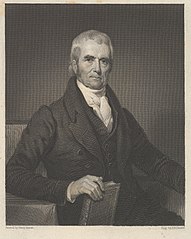 On this day (hat tip: ScotusBlog) in 1819, Chief Justice Marshall (left) delivered the decision of the US Supreme Court in McCulloch v Maryland 17 US (4 Wheat) 316 (1819) (findlaw | Landmark Cases | wikipedia), holding that the US Federal Government had the power to establish the Bank of the United States, and in the process laying down some fundamental constitutional doctrine which underpins many of the world’s constitutions today – not only the US, but the Irish as well. In particular, he asserted that
On this day (hat tip: ScotusBlog) in 1819, Chief Justice Marshall (left) delivered the decision of the US Supreme Court in McCulloch v Maryland 17 US (4 Wheat) 316 (1819) (findlaw | Landmark Cases | wikipedia), holding that the US Federal Government had the power to establish the Bank of the United States, and in the process laying down some fundamental constitutional doctrine which underpins many of the world’s constitutions today – not only the US, but the Irish as well. In particular, he asserted that
… we must never forget that it is a constitution we are expounding (17 US (4 Wheat) 316, 407 (1819) (Marshall CJ) emphasis in original).
A recent conscious Irish echo of this dictum is to be found in the judgment of Barrington J in Irish Times v Ireland [1998] 1 IR 359, [1998] 2 ILRM 161 (2 April 1998) (doc | pdf) [151], where he asserted that
… it is important to remember that we are construing, not a revenue statute, but a constitution.
The trope that a constitution is not to be interpreted as a revenue statute is a common one. For example, in National Union of Railywaymen v Sullivan [1947] IR 77 (HC) 88 Gavan Duffy J held that a Constitution is “emphatically not to be parsed as if it were an Income Tax Act”; whilst in AG v Paperlink [1984] ILRM 373, 385; [1983] IEHC 1 [45] Costello J said that the Constitution is “a political instrument as well as a legal document and in its interpretation the courts should not place the same significance on differences of language used in two succeeding sub-paragraphs as would, for example be placed on differently drafted sub-sections of a Finance Act” (see also Murray v Ireland [1985] IR 532 (SC) 539 (Costello J)).
But quotes such as those from Marshall CJ and Barrington J have divided subsequent generations. Frankfurter J (writing extra-judicially) described the Marshall quote as “the single most important utterance in the literature of constitutional law … most important because most comprehensive and most comprehending” (F Frankfurter “John Marshall and the Judicial Function” 69 Harv L Rev 217, 219 (1955)), but Scalia J (also writing-extrajudicially) more recently described as an often misused old chestnut (A Scalia “Assorted Canards of Contemporary Legal Analysis” 40 Case Western Reserve Law Review 581, 594-596 (1990)). Either way, the status of McCulloch v Maryland as a (perhaps the) leading case on constitutional law is secure.
(Thanks to Daithí, offblog, for discussing these issues and quotes with me!)
It’s amazing how cases and documents as old as these still have profound effects on our judicial system nowadays.
-Jack